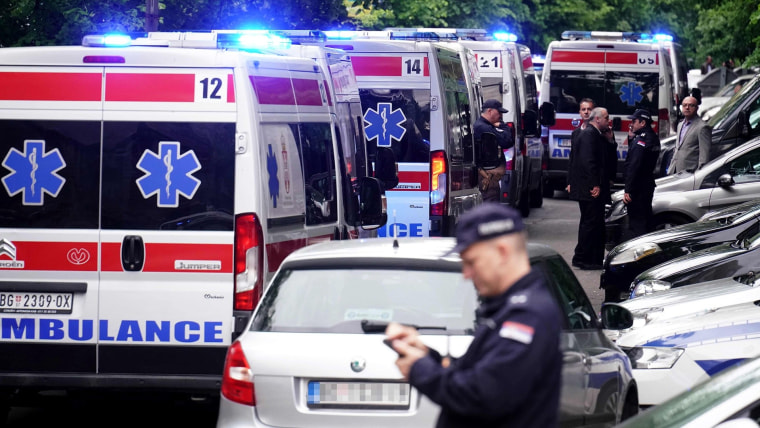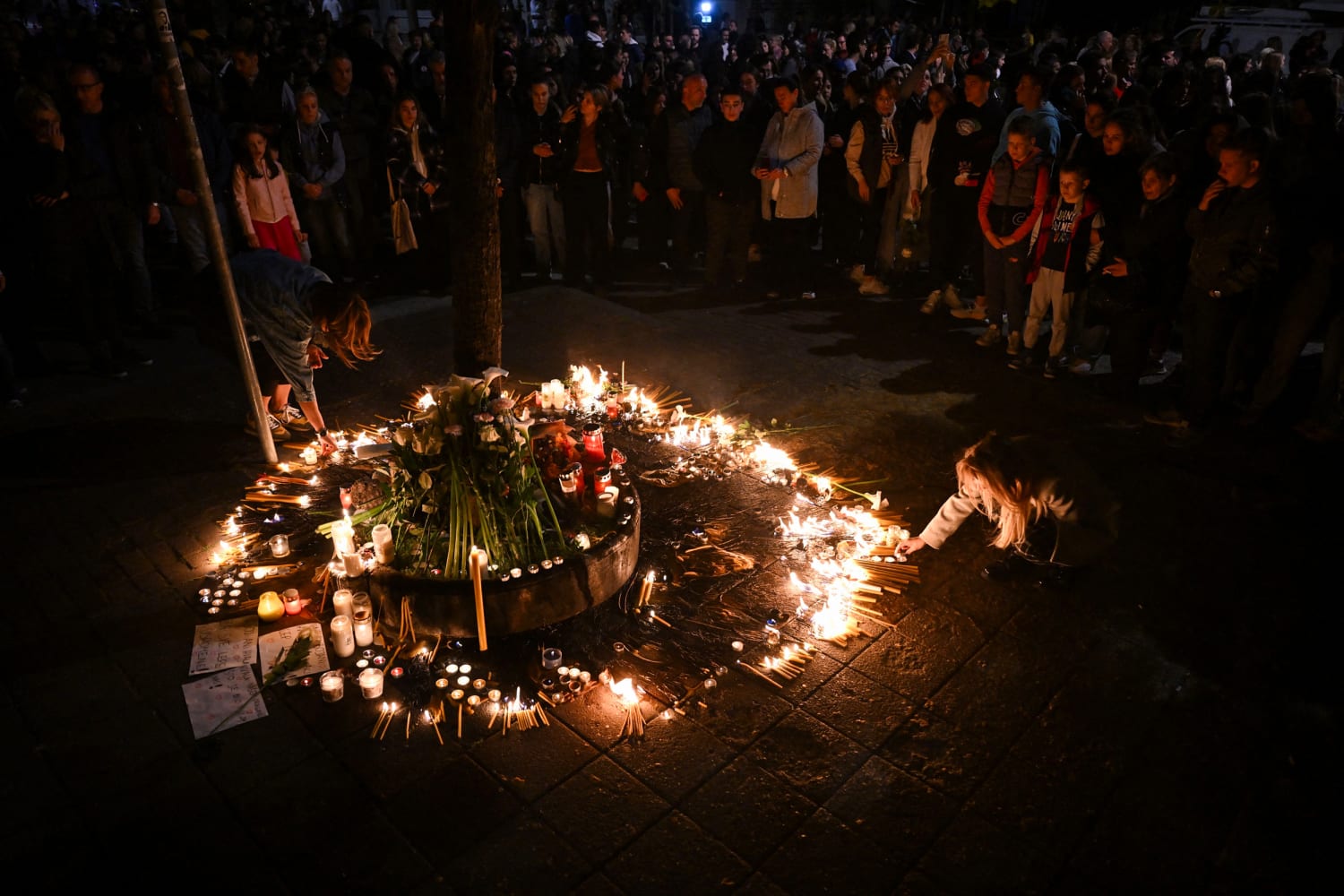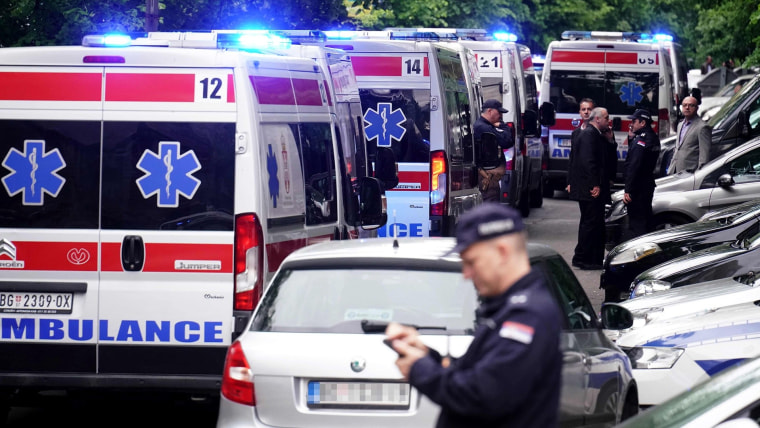BELGRADE, Serbia — Serbia has one of the highest rates of gun ownership in the world, deep political divides and a culture of violence. It might sound familiar to many Americans, but after two mass shootings in two days rocked the country last month, Serbians did something different: They started handing in their guns.
Tens of thousands of people also took to the streets to demand action on guns in cities across the small European nation. And some believe the U.S., where a series of mass shootings overnight Saturday killed at least four people, could learn from the country’s response.
“I think a lot of us have just had enough,” Žarkoerko Cvejić, 42, told NBC News earlier this month outside the Vladislav Ribnikar Model Elementary School in Belgrade, where his 9-year-old daughter, Zora, was present when a seventh-grade student gunned down eight children and a security guard on May 3. Another girl died from injuries two weeks later.
The following day, a young man with a history of violence killed eight people and wounded 14 in the nearby village of Dubona.
Watch “TODAY” on NBC at 8 a.m. ET for more.
Cvejić said Zora was “physically fine, but she’s deeply disturbed emotionally,” after the mass shooting that took place shortly after he’d dropped her off at the school gates.
He said that she had not been able to sleep alone since the incident and preferred to be accompanied at all times. “These are the sort of fears that she didn’t use to have,” he said.
“We are safe,” he said. “But now kids are dead. Something happened that should have never happened at all … something that she couldn’t fathom, something that none of us could fathom would happen in our city.”
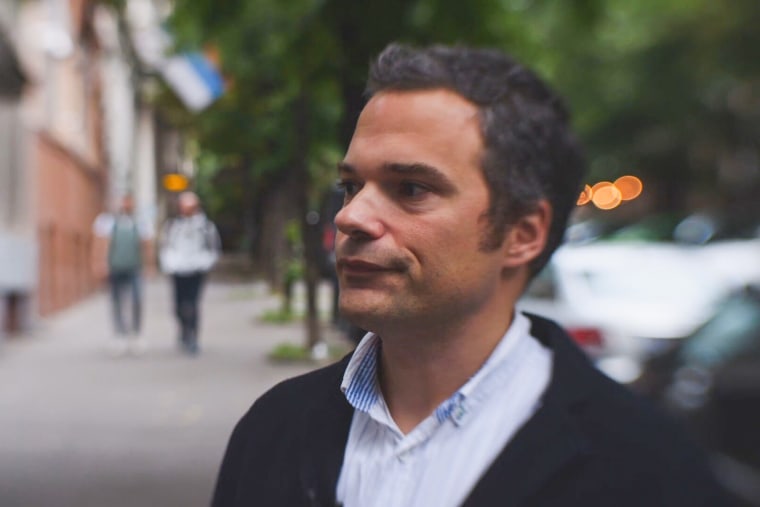
The 13-year-old shooter was not charged with any crime because he was below Serbia’s age of criminal responsibility and is instead undergoing a psychiatric assessment. But his father was charged with serious offense against general security. If convicted, he could face up to 12 years in prison.
Within days the government also launched an amnesty period, allowing citizens to give up unregistered weapons by the end of June without any questions asked.
The response was enormous.
Inside a huge police warehouse on the outskirts of Belgrade, a pile of more than 70,000 revolvers and AK-47s, machine guns and pistols, some rusted, some still gleaming, fills the facility, which is the size of a football field. Some date back to World War II, others are modern.
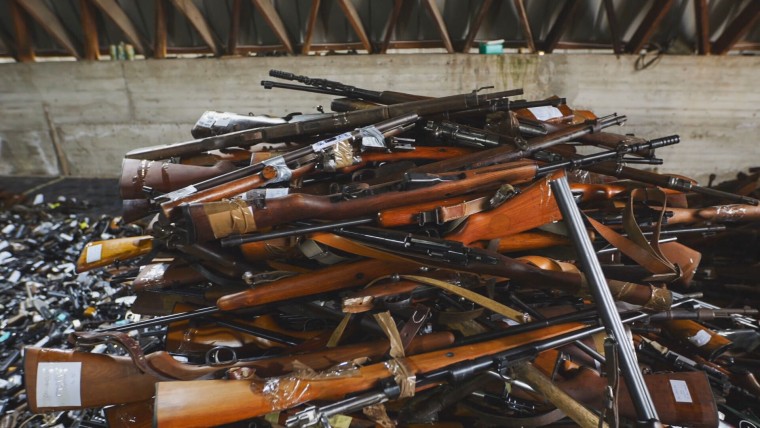
Hundreds of thousands of guns remain in Serbia after a decade of fighting in the 1990s following the breakup of Yugoslavia.
Željko Brkić, the deputy interior minister in charge of the gun recall program, said for every weapon he saw a “life saved” and that he saw people “having a conscience and thinking about others.”
It was not possible for the state to protect every citizen, he said, adding that he was “shocked” by all the mass killings in the U.S. “I can only imagine how you guys feel,” he said.
To those arguing that guns were required for defense, he said he would urge people to “trust the police,” because it was their job to take care of the population.
Under recently introduced legislation, those who have not given up their unregistered weapons now face prison sentences of up to 15 years. Gun owners will face strict background checks, psychological evaluations and regular drug tests. Other measures have also been enacted, including a ban on new gun licenses, stricter controls on gun owners and shooting ranges, and tougher punishment for the illegal possession of weapons.
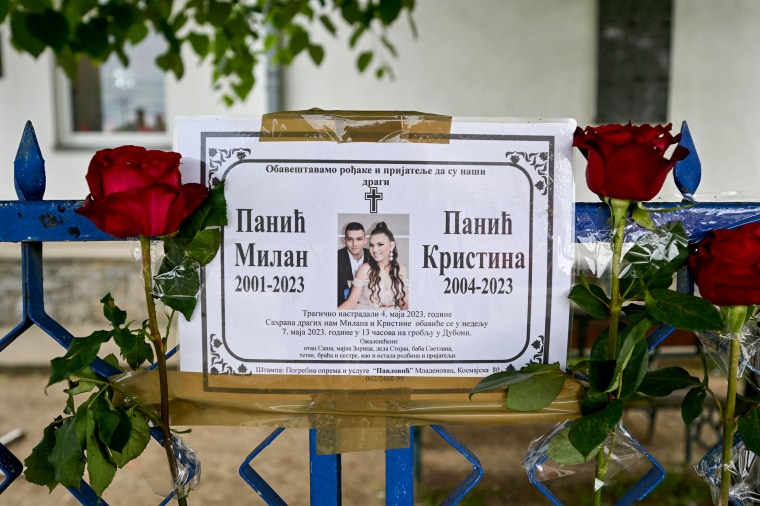
While Serbia is divided on many political issues, such as religion and gender identity, Dobrica Veselinović, an opposition lawmaker and one of the leaders of the anti-violence protests that have swept the capital, said introducing the new laws had been relatively straightforward.
Veselinović said the shootings “really changed public opinion” because it was the first time that Serbia had witnessed mass shootings like those.
Like Australia, New Zealand and the U.K., which tightened rules on gun ownership after mass shootings, he said politicians across the board had been moved to act afterward.
After two mass shootings last year, President Joe Biden signed the law known as the Bipartisan Safer Communities Act — considered the most sweeping measure aimed at preventing gun violence in 30 years. It came days after the Supreme Court ruled that the Constitution provides a right to carry guns outside the home — a major decision that has led to a flurry of challenges to longstanding laws, both federal and state. State laws, meanwhile, remain patchwork. Many have expanded gun rights and others have restricted them.
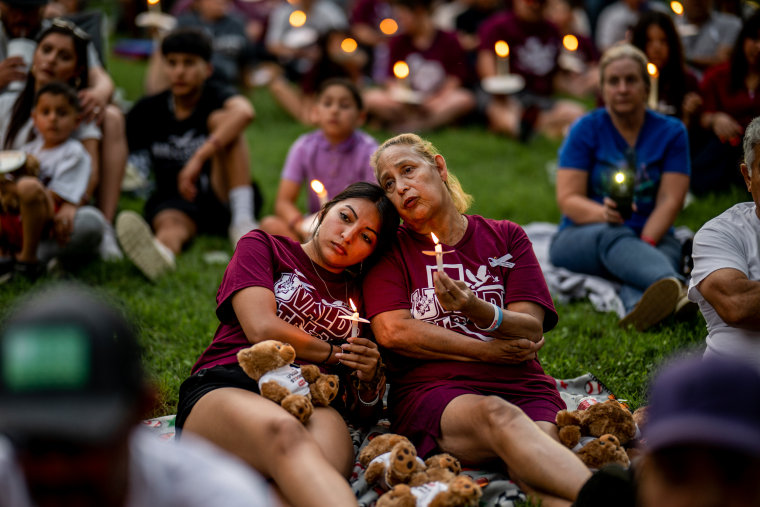
There have been more than 300 mass shootings and almost 20,000 gun deaths in the U.S. this year, according to the Gun Violence archive, a nonprofit organization that tracks the spread of what has been called an American disease. The archive defines a mass shooting as a single incident in which at least four people — other than the shooter — are shot.
Guns, Veselinović said, were “not a vital part of our culture the way it is in the U.S. There’s no Second Amendment.” He added that gun lobbies were also nonexistent in Serbia and so cannot pressure politicians the way they can in the U.S.
“I would say you don’t need more guns. You don’t need more police, more surveillance, more cameras, more security,” he said. “You need more compassion, more listening to each other, more empathy and more understanding of different views of the lives of the leaders.”
For Ivan Urošević, a gun seller and weapons trainer, the new laws have hit his business hard, particularly the two-year moratorium on gun sales. He believes the new regulations go too far, “This is an emotional response to a horrible tragedy” he said, speaking at a shooting range outside the capital. But he didn’t think the U.S. model was right either.
Allowing people to sell and own weapons without tracking them “is complete insanity,” he said, saying that there needed to be “strict or reasonable rules” in place for those trying to purchase them.
While lax gun laws were not a route to violence itself, he added that they could lead to “the normalization of the idea that violence can solve problems.”
For Cvejić, the jury was out as to whether the new laws would make a difference.
“Either we change something profoundly in this society or a few decades from now, we disappear,” he said.
Source: | This article originally belongs to Nbcnews.com
